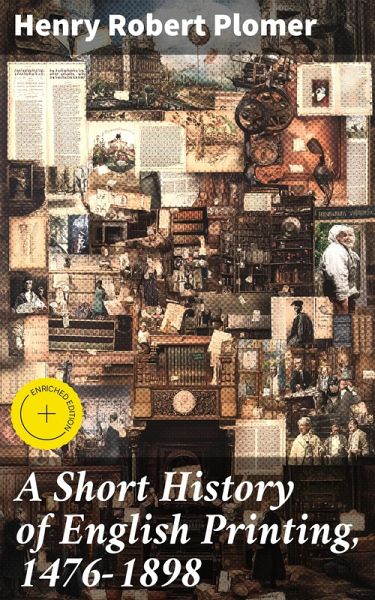
A Short History of English Printing, 1476-1898 (eBook, ePUB)
Enriched edition. Tracing the Evolution of English Printing Culture
Kommentar: Ellsworth, Dorian / Redaktion: Good Press; Pollard, Alfred W.
Sofort per Download lieferbar
2,49 €
inkl. MwSt.
Weitere Ausgaben:

PAYBACK Punkte
0 °P sammeln!
In "A Short History of English Printing, 1476-1898," Henry Robert Plomer meticulously chronicles the evolution of printing in England from its inception to the end of the nineteenth century. This work stands out for its clarity and scholarly rigor, demonstrating Plomer's extensive knowledge of both historical context and technological advancements in printing. Through detailed analysis, he explores the interplay between print technology and the societal transformations it spurred, marking significant contributions from key figures in the industry while navigating various literary movements of ...
In "A Short History of English Printing, 1476-1898," Henry Robert Plomer meticulously chronicles the evolution of printing in England from its inception to the end of the nineteenth century. This work stands out for its clarity and scholarly rigor, demonstrating Plomer's extensive knowledge of both historical context and technological advancements in printing. Through detailed analysis, he explores the interplay between print technology and the societal transformations it spurred, marking significant contributions from key figures in the industry while navigating various literary movements of the period. Henry Robert Plomer, a distinguished bibliographer and a crucial figure in the study of English printing, brings a wealth of expertise to this work. His background in bibliology and his experience in the field, including his tenure as the first librarian of the Stationers' Company, informed his comprehensive understanding of the challenges and triumphs faced by early printers. Plomer's passion for his subject matter is evident in the depth of his research and the breadth of his analysis. This book is an invaluable resource for scholars, students, and anyone with a keen interest in the history of the book. Plomer's insightful observations and masterful synthesis of data provide a profound understanding of the role printing played in shaping English literature and culture. It is an essential read for those who wish to grasp the legacy of the printed word and its enduring impact. In this enriched edition, we have carefully created added value for your reading experience: - Hand-picked Memorable Quotes shine a spotlight on moments of literary brilliance. - Interactive footnotes clarify unusual references, historical allusions, and archaic phrases for an effortless, more informed read.
Dieser Download kann aus rechtlichen Gründen nur mit Rechnungsadresse in A, B, BG, CY, CZ, D, DK, EW, FIN, F, GR, H, IRL, I, LT, L, LR, M, NL, PL, P, R, S, SLO, SK ausgeliefert werden.













